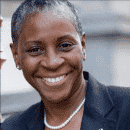[et_pb_section fb_built=”1″ admin_label=”section” _builder_version=”3.22″][et_pb_row admin_label=”row” _builder_version=”3.25″ background_size=”initial” background_position=”top_left” background_repeat=”repeat”][et_pb_column type=”4_4″ _builder_version=”3.25″ custom_padding=”|||” custom_padding__hover=”|||”][et_pb_text admin_label=”Text” _builder_version=”3.27.4″ background_size=”initial” background_position=”top_left” background_repeat=”repeat”]
My job is to use this platform to make a difference.
We had the privilege of having Stephanie Boyce, the President of the Law Society of England and Wales speak to us at our special City Legal Leaders event. Stephanie reflected on the issues of diversity and inclusion in the law profession but these are issues that speak across all professions. The City Legal Leaders event coincided with the week of the first anniversary of the death of George Floyd.
 I. Stephanie Boyce is the 177th, the six female, the first black office holder, the first person of colour, and the second in-house solicitor in almost fifty years to become President of the Law Society.
I. Stephanie Boyce is the 177th, the six female, the first black office holder, the first person of colour, and the second in-house solicitor in almost fifty years to become President of the Law Society.
Stephanie was admitted as a solicitor in 2002 and has a wealth of experience in corporate governance, regulatory frameworks, and professional regulation Stephanie holds a Master of Law in public law and global governance from King’s College, University of London and is a fellow of the Chartered Governance Institute. In 2020 Stephanie was voted onto the Governance Hot 100 – Board Influencer and made the Power List 100 Most Influential Black People in the UK in 2021.
She spoke of the progress already made by individuals, organisations, and society as a whole in the area of diversity, such as the recent global protests all over the world to boost awareness and the revision of curriculums of educational institutions to portray a more balanced view of history. Businesses are also making improvements to create more inclusive workplaces. Stephanie challenged this point further by urging that more change is needed.
Recent research from November 2020 undertaken by the Law Society showed that ethnic minorities had different experiences in the law profession compared to their white colleagues. To access the research report click here. There is need for greater representation in the largest law firms. Representation of ethnic minorities has only grown 1% since 2014. Ethnic minorities work longer hours than white colleagues and are more likely to experience discrimination and bullying in the workplace.
Stephanie suggested these tools to tackle this within the law profession:
- Include prospects for entry to the profession – fair recruitment such as blind shortlisting, contextualised recruitment, setting targets for recruitment
- Doing better to equip and train people – so that all employees feel supported to be the best that they can be and that everyone has the same opportunities for growth
- Mentoring and reciprocal relationships as established programmes to help support people
- Promote a more inclusive atmosphere in workplaces
- A more rigorous to data collection and evaluation – mandatory reporting to help improve issues such as gender pay gap so that improvements can be identified and made
Stephanie’s ambition is to leave the legal profession more diverse than when she found it. But it must be a shared ambition. Everyone of us has a part to play. One way is to become an inclusion ally to non-white colleagues. The Law Society has a great resource on this here. We may not have the same level of influence as Stephanie, and yet how might we use our personal and professional platforms to make a difference?
To watch Stephanie’s talk watch the video below.
[/et_pb_text][/et_pb_column][/et_pb_row][/et_pb_section]
